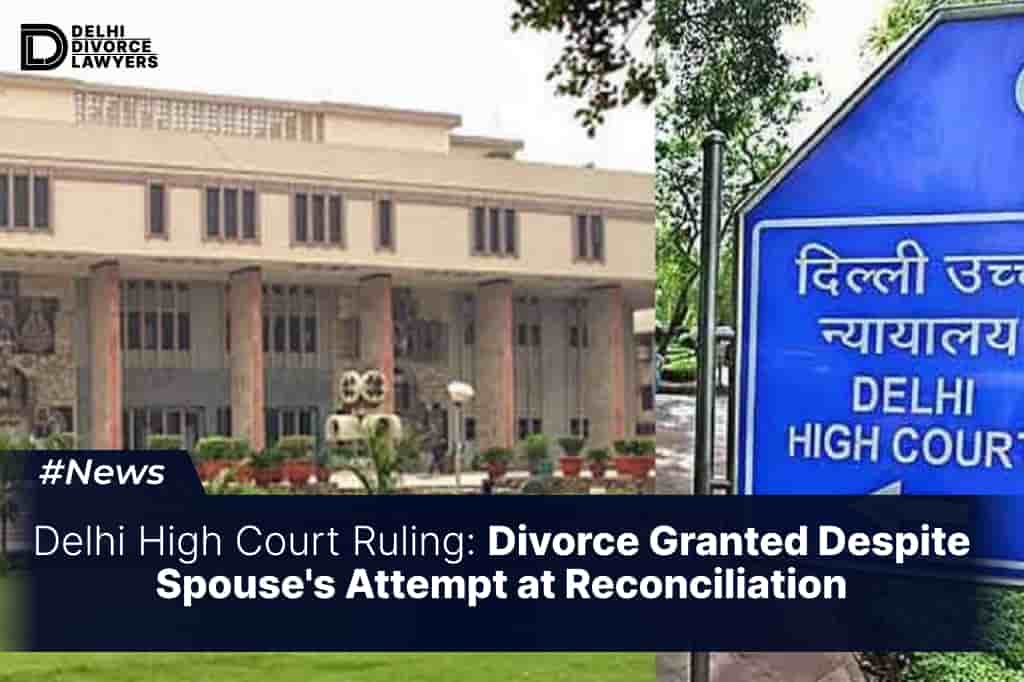The Delhi High Court has affirmed that despite a court order to restore conjugal rights, a spouse retains the right to pursue divorce under Section 13 (1A)(ii) of the Hindu Marriage Act.
In a recent legal matter, the wife appealed under Section 19(1) of the Family Court Act, challenging a divorce decree issued under Sections 13(1)(ia) and 13(1A)(ii) of the Hindu Marriage Act, alleging cruelty and non-enforcement of conjugal rights for over a year subsequent to the decree.
A bench of Justice Neena Bansal Krishna and Justice Suresh Kumar Kait thus observed: “The very fact that Section 13 (1A) (ii) of the Hindu Marriage Act, enures to the benefit of “either party” clearly implies that in case of non-compliance of a Decree under Section 9 of the HMA, either party is entitled to seek divorce on this ground and the Judgment Debtor cannot be precluded from exercising his right to avail the relief thereof. Section 23 cannot be interpreted in a way to completely render the remedy under Section 13 (1A) (ii) otiose”
In this case, the husband, in his petition for divorce, delineated the post-nuptial living arrangements. Initially cohabiting with his parents in Nagina, Haryana, the couple subsequently relocated to Delhi at the behest of the wife, owing to financial constraints, and resided with the husband’s brother and sister-in-law.
Regrettably, recurrent discord between the wife and sister-in-law escalated tensions, prompting the husband to seek separate accommodation in Delhi in 2004. Despite this, discord persisted, particularly upon the husband’s return from work, occasionally resulting in his departure without partaking of sustenance.
Furthermore, the husband procured an insurance policy to provide financial security for his wife in the event of his incapacity. Despite facing financial constraints, he diligently endeavored to support her during pregnancy, notwithstanding her occasional distress. However, matters worsened when she publicly accused him of infidelity post-childbirth, causing significant embarrassment.
Additionally, the wife consistently attributed their difficulties to the husband, particularly regarding financial matters. Her persistent demands exacerbated tensions, leading to frequent disputes due to the husband’s inability to meet her expectations.
“The various incidents narrated by the respondent towards the overall conduct and a non-adjusting attitude of the appellant who lacked maturity to even sort out the differences with the husband, leads to the irresistible conclusion that such conduct was bound to cause a grave apprehension in the mind of the respondent disrupting his mental equilibrium. Though these incidents may seem to be innocuous, insignificant or trifling when considered independently, but when such conduct prevails over a period of time, it is bound to create mental stress of the kind, which makes it impossible for the parties to survive in their matrimonial relationship…A wife should not be a constant reminder of one’s financial limitations. Pressurizing spouse to fulfil distant and whimsical dreams clearly not within his financial reach may create a sense of persistent dissatisfaction which would be sufficient mental strain to drain the contentment and tranquility out of any married life. One must tread carefully between the needs, wants and desires”, the bench noted in the order.
The wife argued that since a decree for the Restitution of Conjugal Rights was issued against the husband and he has failed to adhere to it, he is precluded from benefiting from his own delinquency, pursuant to Section 23 of the Hindu Marriage Act.
“This is also evident from the language of under Section 13 (1A) (ii) of the HMA which is to the effect that “either party”, which includes the decree holder as well as the judgment debtor, who can seek divorce in case of noncompliance of decree of Restitution of Conjugal Rights. If the Parliament intended that it is only the party in whose favour the restitution has been allowed, who can avail the remedy under Section 13 (1A) (ii) of the HMA, then the language would have been accordingly used in the said Section. The very fact that Section 13 (1A) (ii) of the Hindu Marriage Act, enures to the benefit of “either party” clearly implies that in case of non-compliance of a Decree under Section 9 of the HMA, either party is entitled to seek divorce on this ground and the Judgment Debtor cannot be precluded from exercising his right to avail the relief thereof. Section 23 cannot be interpreted in a way to completely render the remedy under Section 13 (1A) (ii) otiose.”, the court said while upholding divorce granted on this ground also.

